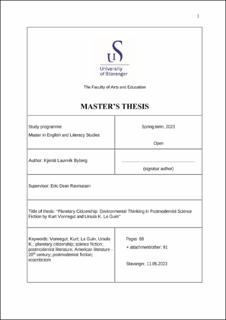| dc.description.abstract | This master’s thesis aims to frame Kurt Vonnegut and Ursula K. Le Guin as environmental thinkers. With climate change becoming an evermore visible treat, this thesis aims to look at how science fiction can provide a useful perspective on environmental issues and give readers a new perspective to approach these issues. More specifically, it aims to conceptualize the term planetary citizenship and explore how both Vonnegut’s Galápagos (1985) and Le Guin’s The Dispossessed: An Ambiguous Utopia (1974) are prompting readers to reconceptualise their idea of what it means to be a citizen. In working with planetary citizenship and engaging with environmental themes and ideas that have been picked up by critics, the thesis aims to lay out how these authors are thinking about environmental issues in their work in the beginning of the environmental movement. It argues that Vonnegut and Le Guin are both environmental thinkers and that their work prompts readers to reconceptualise their idea of citizenship in a way that will help thinking about climate change and other environmental issues by contextualizing the implications of these issues. It builds upon the current critical interest in Vonnegut and Le Guin to explore the environmental themes and ideas that have been discussed in their work. Further on, uses close reading of the texts to find evidence of their environmental thinking beyond what the critics have explored. The thesis concludes that both Vonnegut and Le Guin are thinking in terms of a planetary citizenship based on findings in Galápagos and The Dispossessed. Because the narratives are dealing with entire planets and the human species as a whole, it shows how the narratives have a planetary perspective that includes both the human and the non-human. The thesis shows how science fiction is a good genre for discussing environmental issues and it gives readers a new perspective to how to consider themselves a citizen of the planet. The thesis demonstrates how thinking in terms of a planetary citizenship is a useful tool in analysing environmental literature and science fiction. | |
